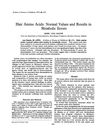 25 citations,
June 2019 in “Endocrine Related Cancer”
25 citations,
June 2019 in “Endocrine Related Cancer” Mutations in certain receptors can cause diseases and offer new treatment options.
 25 citations,
March 2019 in “Dermatologic therapy”
25 citations,
March 2019 in “Dermatologic therapy” Intralesional therapy for keratoacanthoma is effective and has fewer side effects than systemic treatments.
 25 citations,
November 2017 in “Molecular Medicine Reports”
25 citations,
November 2017 in “Molecular Medicine Reports” PlncRNA-1 helps hair follicle stem cells grow and develop by controlling a specific cell signaling pathway.
 24 citations,
July 2017 in “Structure”
24 citations,
July 2017 in “Structure” FGF9 controls which receptors it binds to through a process where two FGF9 molecules join, and changes in FGF9 can lead to incorrect receptor activation.
 24 citations,
October 2014 in “Cold Spring Harbor Perspectives in Medicine”
24 citations,
October 2014 in “Cold Spring Harbor Perspectives in Medicine” Genetic research has advanced our understanding of skin diseases, but complex conditions require an integrative approach for deeper insight.
 24 citations,
November 2008 in “Arquivos Brasileiros de Endocrinologia & Metabologia”
24 citations,
November 2008 in “Arquivos Brasileiros de Endocrinologia & Metabologia” Four patients with a type of rickets and hair loss had different mutations in their vitamin D receptor gene, causing it to not work properly.
 24 citations,
July 1987 in “Dermatologic Clinics”
24 citations,
July 1987 in “Dermatologic Clinics” Systemic diseases can cause hair loss, which is often reversible with treatment.
 23 citations,
June 2015 in “Clinica Chimica Acta”
23 citations,
June 2015 in “Clinica Chimica Acta” Researchers found potential urine markers for polycystic ovary syndrome, including testosterone-glucuronide and 11α-hydroxyprogesterone, which may help diagnose the condition.
 23 citations,
December 2004 in “Differentiation”
23 citations,
December 2004 in “Differentiation” Sex hormones affect hair and feather growth and may help manage alopecia and hormone-dependent cancers.
 22 citations,
October 2012 in “Journal of Investigative Dermatology”
22 citations,
October 2012 in “Journal of Investigative Dermatology” Altered retinoid metabolism in cicatricial alopecia suggests a balanced vitamin A diet may prevent the condition.

Oral minoxidil effectively treats hair loss, with women needing lower doses (0.25 to 2.5 mg daily) and men needing higher doses (1.25 to 5 mg daily).
 21 citations,
July 2017 in “Journal of Cosmetic and Laser Therapy”
21 citations,
July 2017 in “Journal of Cosmetic and Laser Therapy” Vesicular carriers like liposomes may improve cosmetic skin treatment delivery and effectiveness but need more human research.
 20 citations,
January 2017 in “Scientific reports”
20 citations,
January 2017 in “Scientific reports” Whale genes show changes that help them live in water, like less hair and better flippers.
 20 citations,
July 2013 in “European Journal of Oral Sciences”
20 citations,
July 2013 in “European Journal of Oral Sciences” A new PAX9 gene mutation causes missing teeth and hair problems, but not skin or nail issues.
 20 citations,
September 2006 in “The Veterinary clinics of North America. Small animal practice/Veterinary clinics of North America. Small animal practice”
20 citations,
September 2006 in “The Veterinary clinics of North America. Small animal practice/Veterinary clinics of North America. Small animal practice” New drugs are improving treatment for hormone-related diseases in small pets.
 20 citations,
September 2005 in “Clinics in Dermatology”
20 citations,
September 2005 in “Clinics in Dermatology” Some skin problems can be signs of diabetes or other metabolic diseases and recognizing them can help diagnose and treat these diseases early.
 19 citations,
November 2018 in “Nutrients”
19 citations,
November 2018 in “Nutrients” Annurca apple extract may protect mouse hair from damage by chemotherapy and could help treat hair loss without promoting cancer growth.
 19 citations,
December 2015 in “European Journal of Human Genetics”
19 citations,
December 2015 in “European Journal of Human Genetics” A rare ITGB6 gene variant causes intellectual disability, hair loss, and dental issues.
 19 citations,
January 2009 in “International review of cell and molecular biology”
19 citations,
January 2009 in “International review of cell and molecular biology” Hair's strength and flexibility come from its protein structure and molecular interactions.
 18 citations,
February 2022 in “Cell Death Discovery”
18 citations,
February 2022 in “Cell Death Discovery” ECM1-modified stem cells can effectively treat liver cirrhosis.
 18 citations,
April 2019 in “Archives of Dermatological Research”
18 citations,
April 2019 in “Archives of Dermatological Research” Lactoferrin helps mice grow hair by increasing cell growth and hair follicle development.
 18 citations,
October 2018 in “Nutrients”
18 citations,
October 2018 in “Nutrients” Annurca apple extract promotes hair growth by changing hair follicle metabolism to boost keratin production.
 17 citations,
July 2017 in “Molecular and Cellular Endocrinology”
17 citations,
July 2017 in “Molecular and Cellular Endocrinology” Effective treatments for spinal and bulbar muscular atrophy are not yet available; more research is needed.
 16 citations,
June 2017 in “JAMA Dermatology”
16 citations,
June 2017 in “JAMA Dermatology” Thalidomide works best for skin lupus not helped by antimalarials, but has many side effects; other treatments are less effective, especially if patients also have systemic lupus.
 16 citations,
December 2016 in “Molecular Medicine Reports”
16 citations,
December 2016 in “Molecular Medicine Reports” Platelet-rich plasma may help hair follicle cells grow by affecting certain genes and pathways.
 15 citations,
July 2004 in “Journal of morphology”
15 citations,
July 2004 in “Journal of morphology” Monotreme hair structure and protein distribution are similar to other mammals, but their inner root sheath cornifies differently, suggesting a unique evolution from reptile skin.
 15 citations,
May 1997 in “Annals of Internal Medicine”
15 citations,
May 1997 in “Annals of Internal Medicine” Tamoxifen caused hair loss in a 52-year-old woman.
 15 citations,
October 1970 in “Archives of disease in childhood”
15 citations,
October 1970 in “Archives of disease in childhood” Hair amino acid levels can indicate metabolic disorders.
 14 citations,
July 2021 in “Reviews in endocrine and metabolic disorders”
14 citations,
July 2021 in “Reviews in endocrine and metabolic disorders” SARS-CoV-2, the virus causing COVID-19, can affect all endocrine organs and systems, altering their function and potentially leading to disorders. Factors like diabetes and obesity increase infection risk and severity. Understanding these effects is key for effective treatment.
 14 citations,
January 2018 in “Endocrine”
14 citations,
January 2018 in “Endocrine” Cantú syndrome may be linked to pituitary adenomas.






























